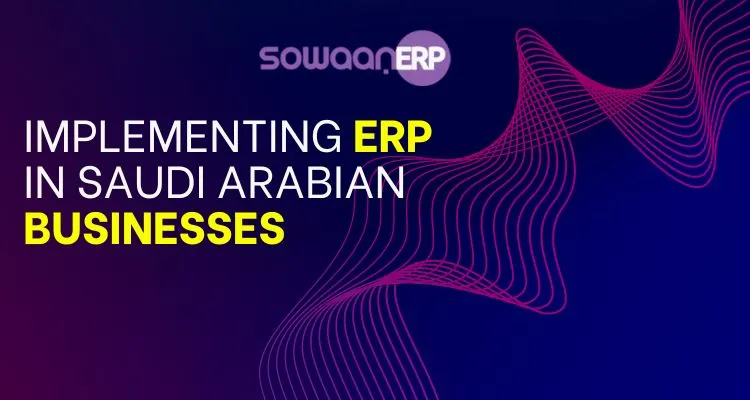
The business landscape is rapidly evolving, and Saudi Arabian businesses are no exception. To stay ahead, implementing ERP software in Riyadh has become a necessity. This strategic move offers numerous benefits that we’ll explore in this blog.
ERP software not only brings operational efficiency but also provides critical insights that can help businesses make informed decisions. It integrates various business processes into a single platform, reducing redundancies and improving productivity. Furthermore, it ensures regulatory compliance, an aspect crucial for businesses operating in diverse legal environments. It also enhances customer service by offering a unified view of customer interactions. Lastly, with cost-effective management of resources, it aids in reducing operational costs, contributing to the bottom line.
Streamlining business processes
Firstly, implementing ERP can significantly streamline business processes. It integrates various functions into one comprehensive system, reducing the need for disparate software. This leads to efficient data management and process optimization, enabling businesses to operate more effectively. The elimination of data silos also ensures that all departments have access to the same, up-to-date information, leading to better coordination and collaboration. Furthermore, it eliminates manual, time-consuming processes, which translates into faster turnaround times. Automation of routine tasks reduces the risk of human error, enhancing the overall quality of work. Plus, it provides a bird’s-eye view of operations, allowing for timely identification and resolution of bottlenecks. All these factors contribute to a smoother, more efficient workflow.
Enhancing decision making
Moreover, with the help of ERP software Riyadh businesses can enhance their decision-making abilities. The system provides real-time data and analytics, facilitating informed decisions. Thus, businesses can respond quickly to market changes, gaining a competitive edge. Beyond that, the predictive analytics features of many ERP systems can offer insights into future trends, enabling proactive decision making. These insights can guide everything from product development to marketing strategies. In addition, the system’s ability to integrate data from various departments means that decision-makers have a holistic view of the business at their fingertips. This comprehensive understanding promotes strategic alignment across the organization. Lastly, by eliminating guesswork, ERP software reduces risks associated with business decisions, leading to improved outcomes.
Improving customer service
Additionally, implementing ERP software also improves customer service. It provides a unified view of customer interactions, allowing for personalized service and better response times. As a result, businesses can maintain strong relationships with their customers, ensuring their loyalty. One significant advantage is the system’s ability to track customer history, which can be used to anticipate needs and offer tailored solutions. This kind of proactive service can significantly enhance customer satisfaction. Moreover, ERP systems streamline complaint management, ensuring issues are promptly addressed and resolved. This efficiency reduces customer frustration and increases their likelihood to remain loyal. Plus, with the ability to analyze customer behavior and trends, businesses can identify opportunities for upselling or cross-selling, further boosting profitability. Lastly, by automating routine tasks, ERP frees up staff to focus on more critical, customer-facing activities.
Boosting financial management
Further, an ERP system can boost financial management. It automates financial operations, reducing errors and ensuring accuracy. Consequently, businesses can better manage their finances, leading to increased profitability. By providing real-time access to financial data, it allows for immediate tracking and monitoring of financial performance. This instant visibility can help identify trends, control costs, and drive effective budgeting. The system’s reporting capabilities also simplify compliance with regulatory standards, making audits a less daunting task. In addition, ERP systems can streamline the accounts payable and receivable processes, improving cash flow. Lastly, by integrating financial data with other business functions, it enables strategic financial decisions that support the overall business objectives.
Increasing productivity
Furthermore, productivity increases when businesses buy ERP software in Riyadh. By automating repetitive tasks, ERP frees up employees’ time, allowing them to focus on strategic activities. This leads to improved productivity and efficiency. The ERP system also enhances collaboration by providing a centralized platform where teams can share information and work together more effectively. This improved communication can lead to innovative ideas and solutions. Moreover, the system’s ability to provide real-time data helps in faster decision making, eliminating delays and enhancing the overall operational speed. With streamlined processes and reduced manual work, there is also less chance for errors, further increasing productivity. Lastly, an ERP system often results in better project management, as it provides tools for planning, scheduling, and tracking project progress, ensuring timely completion and delivery.
Ensuring compliance and reducing operational costs
Also, ERP software implementation in Riyadh helps businesses ensure compliance with local and international regulations. The system tracks and reports on compliance issues, preventing any potential legal problems.
Finally, implementing ERP can reduce operational costs. By integrating all business functions, it eliminates the need for multiple systems, leading to cost savings. Therefore, businesses can allocate resources more effectively.
Conclusion
the benefits of ERP software in Riyadh are manifold. From streamlining business processes to enhancing decision making, improving customer service, boosting financial management, increasing productivity, ensuring compliance, and reducing operational costs, implementing ERP is a strategic move that Saudi Arabian businesses should consider. It’s not just a software purchase, but an investment in the future success of the business.
